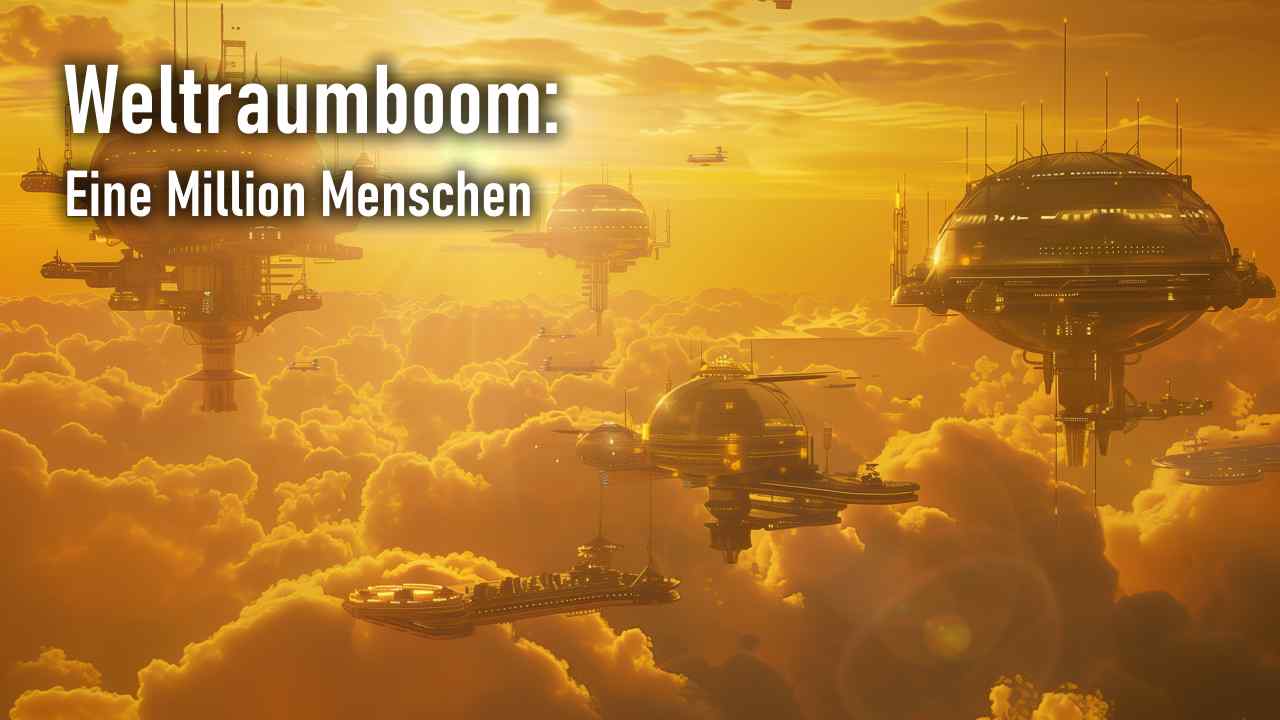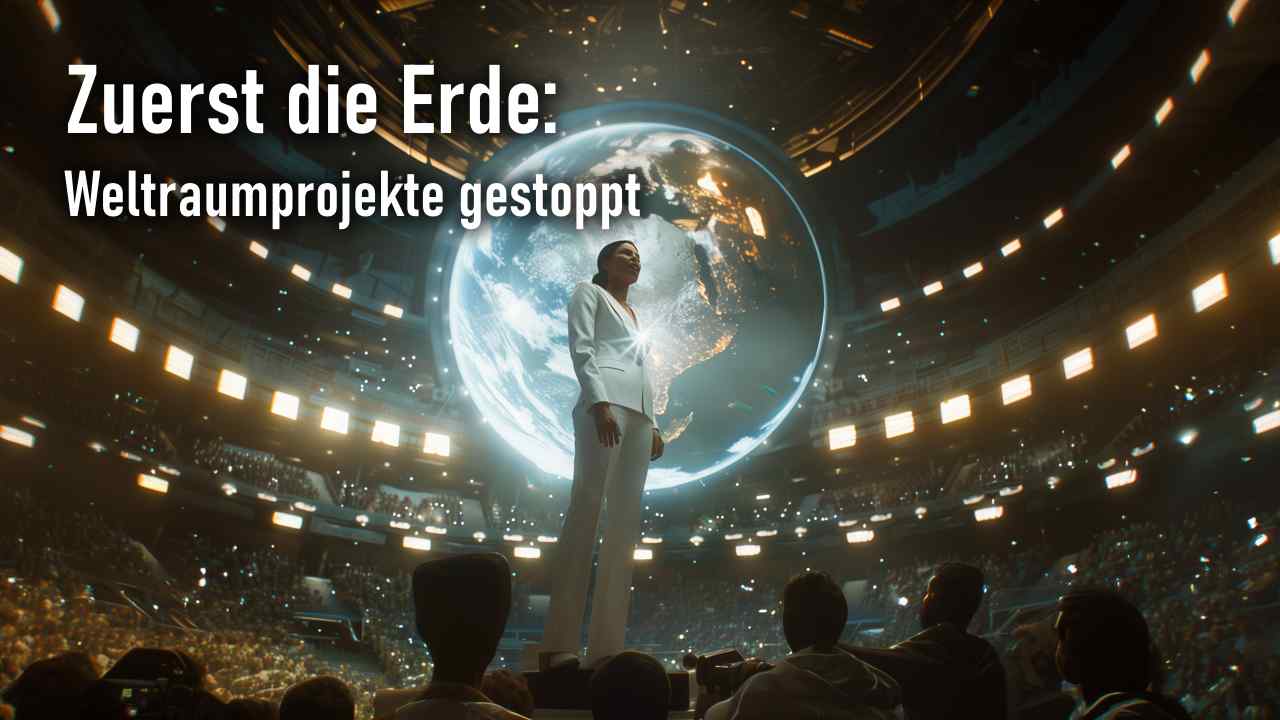
2269 Eine Million außerhalb der Erde

Am dreihundertsten Jahrestag der ersten Mondlandung leben eine Million Menschen und Uploads außerhalb der Erde. Die Bevölkerung verteilt sich über einen großen Teil des Sonnensystems. Insgesamt gibt es 12.000 bewohnte Strukturen: Raumstationen, Raumschiffe, Industrieanlagen, rotierende Habitate, Asteroidenbasen und weitgehend automatisierte Infrastrukturanlagen. Diese Einrichtungen spiegeln die fortschrittlichen technologischen Fähigkeiten und die Vielzahl der Aktivitäten von privaten, unternehmerischen und staatlichen Akteuren wider, die die Präsenz der Menschheit im Weltraum vorantreiben.
In der Erdumlaufbahn leben 320.000 Menschen in rotierenden Habitaten. Darüber hinaus beherbergen unzählige Raumstationen, Industrieanlagen und verschiedene andere Strukturen weitere 70.000 Menschen. Die Erdumlaufbahn ist die geschäftigste Region des Sonnensystems und inzwischen sehr wichtig für Hightechprodukte in Informationstechnik und Biotechnologie.
Der Mond und der cislunare Raum sind ebenfalls zu wichtigen Zentren menschlicher Besiedlung geworden. Auf dem Mond leben 210.000 Menschen, vor allem in großen Mondbasen, Industrieanlagen und Raumstationen. Der cislunare Raum, das Gebiet zwischen Erde und Mond, einschließlich der Lagrange-Punkte, beherbergt weitere 230.000 Menschen, hauptsächlich in rotierenden Habitaten und Raumstationen. Vor allem Lagrange-5 ist sehr wichtig für die orbitale Wirtschaft mit industriellen Aktivitäten, die inzwischen schon dem Erdorbit Konkurrenz machen. L5 ist auch Ausgangspunkt für viele Operationen im Gürtel.
Jenseits des Erde-Mond-Systems ist der Mars mit 40.000 Einwohnern, die sich auf Bodenbasen, Raumschiffe und Industrieanlagen verteilen, das nächste bedeutende Bevölkerungszentrum. Die inneren Planeten, einschließlich Venus und Merkur, sowie der Asteroidengürtel beherbergen kleinere, aber bedeutende Basen im Raum und auf den Planeten, die sich auf Forschung und industrielle Produktion konzentrieren. Insbesondere die Wolkenstädte der Venus beherbergen 50.000 Menschen. Sie sind ein Symbol für den Einfallsreichtum und die Anpassungsfähigkeit der menschlichen Expansion.
In den nahen Sonnenumlaufbahnen gibt es eine bedeutende Energieinfrastruktur, die von 20.000 Menschen gewartet wird und für die Versorgung der unzähligen menschlichen Aktivitäten im gesamten Sonnensystem unverzichtbar ist. Die äußeren Regionen tragen mit insgesamt 20.000 Menschen, zur menschlichen Präsenz im Sonnensystem bei. Die Aktivitäten im äußeren System werden noch dominiert durch Forschungsstationen. Dort gibt es riesige astronomische Instrumente und außerdem Raum- und Bodenstationen, die die großen Planeten und deren Monde erforschen.
2281 Entwicklung des Gedankenabstraktums (Mind State Abstract) als interaktive Nachricht

Das Abstraktum wird vor allem zur Kommunikation im Sonnensystem eingesetzt, wo die Lichtgeschwindigkeit Dialoge verhindert.
Das Gedankenabstraktum enthält Meinungen und Verhaltensweisen des Originals. Es kann einen interaktiven Gesprächspartner darstellen, der so wie das Original reagiert und argumentiert, ohne selbst Bewusstsein zu empfinden.
Das Gedankenabstraktum ist eigentlich ein unvollständiger Abzug des Bewusstseins. Es ist nicht geeignet als Grundlage für eine KI. Im Gegensatz zum Upload-Prozess, wird das Abstraktum aber nicht-destruktiv hergestellt. Es dient als Verhaltensschablone für eine KI-Simulation.
Es dauert 30 Jahre, bis die komplexe Technologie kommerziell eingesetzt werden kann. Um das Jahr 2310 kann man ein Gedankenabstraktum etwa zum Preis eines persönlichen Besuchs versenden. Allerdings reist das Abstraktum als Datenpaket viel schneller, mit Lichtgeschwindigkeit. Die Empfangsseite braucht eine KI-Simulation, die das Abstraktums interpretiert und interpoliert. Die Interaktion des Abstraktums mit dem Empfänger wird typischerweise als Slink zurückgeschickt.
Das Gedankenabstraktum ist nur ein interaktiver Gesprächspartner. Es hat keine Eigeninitiative wie Menschen und bewusste KI. Aber es spart zeitraubende Reisen in Fällen wo Interaktion und Diskussion notwendig sind.
2284 Trennung der Erde

Bürgerinnen und Bürger der Erde,
Heute treffen wir eine Entscheidung, die unsere Zukunft und die künftiger Generationen prägen wird. Als Sprecherin des Weltrats komme ich zu Ihnen mit einer klaren Botschaft: Wir müssen unseren Kurs ändern.
Seit Jahrhunderten haben wir unseren Blick in die Ferne gerichtet. Wir haben eine starke Präsenz im Weltraum aufgebaut und vorher nicht für möglich gehaltene Ziele erreicht. Doch in unserem Streben nach den Sternen haben wir unsere eigene Welt vernachlässigt. Unsere Erde befindet sich in einer schweren Krise – geplagt von Umweltzerstörung, sozialer Ungleichheit und wirtschaftlicher Benachteiligung. Wir können es uns nicht länger leisten, diese dringenden Probleme zu ignorieren. Und wir können es uns nicht länger leisten, den Weltraum weiter zu subventionieren.
Nach gründlichen Beratungen hat der Weltrat beschlossen, die interplanetaren Entwicklung einzustellen und unsere gesamten Anstrengungen darauf zu konzentrieren, die Erde zu retten. Wir schätzen unsere bisherigen Weltraumprojekte und Erfolge im Sonnensystem, aber wir müssen unsere Prioritäten neu ordnen. Wir müssen unsere Ambitionen mit Verantwortung und Gerechtigkeit in Einklang bringen und das Wohl der Erdbewohner in den Vordergrund stellen.
Wir werden ein umfangreiches Programm zur Wiederherstellung unseres Planeten ins Leben rufen. Wir werden große Flächen wieder aufforsten, Ökosysteme wieder aufbauen, den Klimawandel bekämpfen und massiv in Bildung, Gesundheitswesen und nachhaltige Lebensgrundlagen investieren. Das wird nicht einfach sein. Wir werden Entbehrungen und Opfer bringen müssen. Aber unser fernes Ziel – den Heimatplaneten für unsere Kinder zu retten – ist jede Anstrengung wert.
Uns ist bewusst, dass diese Entscheidung unsere interplanetaren Partner und die gesamte menschliche Zivilisation im Sonnensystem betrifft. Diese Anpassungen werden schwierig sein, aber wir vertrauen auf die Widerstandsfähigkeit und Innovationskraft unserer Partner im Weltraum. Wir vertrauen darauf, dass sie auf eigenen Füßen stehen können.
Den Völkern der Erde sagen wir: Unsere Reise beginnt gerade. Wir schlagen einen neuen Weg ein, der Entschlossenheit, Opferbereitschaft und Einheit erfordert. Wir sind entschlossen, unseren Planeten zu heilen, auch wenn es Hunderte von Jahren dauert. Wir müssen eine starke, nachhaltige Grundlage für zukünftige Generationen schaffen. Mutter Erde wird wieder bessere Tage sehen.
Für unsere interplanetaren Partner: Wir schätzen unsere gemeinsamen Errungenschaften und hoffen auf eine Zukunft in Freundschaft und gegenseitigem Respekt. Gemeinsam werden wir den Herausforderungen begegnen, die vor uns liegen.
Dies ist eine Zeit für Handeln, eine Zeit unerschütterlicher Entschlossenheit und Hoffnung. Gemeinsam werden wir unseren Planeten retten und eine gerechte und nachhaltige Zukunft für alle sichern.
Ich danke Ihnen.
Lea Perres, Sprecherin des Weltrats, Virtuelle Halle der planetaren Vollversammlung, 2284.
Der Weltrat unter der Führung der Neosozialistin Lea Perres trifft eine weitreichende Entscheidung: Die Erde zieht sich aus der interplanetaren Entwicklung zurück. Diese Entscheidung verändert den Verlauf der menschlichen Geschichte. Fünf Jahre später tritt die Erde aus der Organisation der Vereinten Planeten (UPO) aus.
Lea Perres, eine überzeugte Anti-Expansionistin, wird als Verteidigerin der Freiheit gegen die Diktatur der Weltfreundschaft bekannt. Nach der Befreiung wird Lea Perres zunächst Übergangspräsidentin der planetaren Union. Mit den Wahlsiegen der Neosozialisten wird sie später Mehrheitsführerin und Sprecherin des Weltrats. Sie engagiert sich besonders für die Bewältigung ökologischer und sozialer Probleme der Erde. Ihre charismatische Persönlichkeit überzeugt viele Menschen, dass erst die Probleme auf der Erde gelöst werden müssen, bevor die Präsenz im Raum weiter ausgebaut werden kann. Damit ebnet sie den Weg für den Trennungsbeschluss im Jahr 2284.
Bis zum späten 23. Jahrhundert haben bedeutende technologische Fortschritte den interplanetaren Verkehr und die orbitale Industrie verändert. Materiestrahl-Technologie macht Reisen im Sonnensystem wirtschaftlich tragfähig. Durchbrüche im Strahlenschutz und -therapie ermöglichen längere Aufenthalte im Weltraum. Autofabs, universelle 3D-Drucker, stellen aus Metamaterialien Alltagsgegenstände und Stationstechnik her. Mit Solarenergie aus Anlagen in sonnennahen Umlaufbahnen wird ein Großteil der interplanetaren Industrie betrieben, und orbitale Fabriken produzieren moderne delokalisierte Informationstechnologie, biomedizinische Produkte und lebensverlängernde Medikamente für den irdischen Markt.
Obwohl die Weltraumwirtschaft erwachsen geworden ist, fließen immer noch viele Mittel der Erde in den Weltraum. Die reinen Subventionen für die Weltraumentwicklung haben stark abgenommen, dafür sind die Zahlungen für orbitale Produkte und Projekte im Raum erheblich angestiegen. Es gibt immer noch einen starken Kapitalabfluss von der Erde in den Weltraum. Trotzdem profitiert nur ein kleiner Teil der Erdbevölkerung von den Hightechprodukten des Orbits. Das führt zu einer wachsenden Kluft zwischen denjenigen, die von der interplanetaren Wirtschaft profitieren, und den vielen, die auf der Erde zurückbleiben.
Die Entscheidung, die interplanetare Entwicklung nicht weiter zu fördern, ist das Ergebnis intensiver Diskussionen und Auseinandersetzungen im Weltrat auf Kreta. Viele der Mitgliedsstaaten sind seit der Befreiung von der Diktatur der Weltfreundschaft neosozialistisch, aber nicht alle. Es gibt auch wichtige expansionistische Bundesstaaten, die gegen diese Entscheidung sind. Mächtige irdische Gigakonzerne mit nur geringen Weltraumaktivitäten unterstützen die neosozialistische Agenda. Im Gegensatz dazu lehnen die weltraumorientierten Konglomerate, die die Expansion im Sonnensystem vorantreiben, die Entscheidung vehement ab. Sie befürchten große wirtschaftliche Einbußen und technologische Rückschritte.
Der Rückzug der Erde aus der UPO verändert die Dynamik der Organisation erheblich. Obwohl die Erde eine wichtige Beitragszahlerin der Space Patrol war und allein durch ihre Größe, Bevölkerung und Wirtschaftskraft erheblichen Einfluss hatte, dominierte sie die UPO nie. Interplanetare Mächte wie die Marsnationen, das Ganymed-Direktorat und die Palladische Liga sind durch weitgehende Automatisierung wirtschaftlich mächtig, obwohl sie eine viel kleinere Bevölkerung haben. Sie haben der von der Erde gegründeten Space Patrol nie vertraut, nachdem diese vor langer Zeit versucht hatte, ihre Unabhängigkeit zu verhindern. Für die verbliebenen Mitglieder der UPO wirkt der Rückzug der Erde auf der politischen Ebene befreiend, wirtschaftlich aber ist es ein schwerer Schlag. Sie fühlen sich nicht länger von der Erde bevormundet, stehen aber nun vor der gewaltigen Aufgabe, die verlorene wirtschaftliche und technologische Unterstützung ersetzen zu müssen.
Die Erde stellt nicht nur die Subventionierung der Weltraumprojekten ein, sondern schließt auch die großen und teuren wissenschaftliche Instrumente im Asteroidengürtel. Noch wichtiger und verheerender für die orbitale Wirtschaft ist, dass die Erde Gesetze erlässt, die allen Handel mit dem Weltraum jenseits der geostationären Umlaufbahn verbieten.
Durch den Verlust der Erde als Markt und Quelle für Technologie, Nahrungsmittel und essenzielle Rohstoffe geraten interplanetaren Einrichtungen in eine schwierige Lage. Die solare Wirtschaft ist immer noch auf erhebliche Unterstützung von der Erde angewiesen. Sie muss sich nun an die neue Lage anzupassen. Viele Außenposten kämpfen ums Überleben. Durch fehlende Ersatzteile gibt es Unfälle, bei denen die Lebenserhaltung von Stationen zusammenbricht, teilweise mit erheblichen Verlusten an Menschenleben. Mehrere Raumstationen und entlegene Asteroidenbasen müssen aufgegeben werden, weil Maschinen versagen oder lebenswichtige Gase und Wasser fehlen. Es gibt viele verzweifelte Reparaturversuche, letzte Versorgungsflüge und Evakuierungen. Der Weltraum ist bereits unter optimalen Bedingungen gefährlich, aber wenn Ressourcen knapp werden, fallen Ausrüstungen und Gesellschaften auseinander, oft mit tödlichen Folgen. Es ist eine schwierige Zeit. Aber irgendwann wird die interplanetare Zivilisation selbstständig und unabhängig von der Erde.
Die öffentliche Reaktion auf die Entscheidung ist weitgehend positiv. Die Bevölkerung der Erde, der die Entwicklung im Weltraum jenseits des Erdorbits wenig Vorteile bringt, begrüßt die neuen Pläne zur ökologischen und wirtschaftlichen Rehabilitation des Planeten. Aber es gibt es auch eine starke Opposition. Einige wichtige Mitgliedstaaten und Unternehmen lehnen die Trennung ab. Sie unterstützen eine Gegenbewegung. Ein radikaler expansionistischer Untergrund entsteht. Diese Gruppen fühlen sich abgeschnitten vom Potenzial des Weltraums und von einer interplanetaren Zukunft. Die militante expansionistische Bewegung glaubt, dass die Zukunft der Menschheit in den Sternen liegt und sie befürchtet, dass eine rein erdgebundene Gesellschaft zu Stagnation und Niedergang führt. Sie organisieren Widerstand gegen die neo-sozialistische Politik und fordern eine Rückkehr zu aktiver interplanetarer Entwicklung.
Die Entscheidung der Erde, sich von der interplanetaren Entwicklung loszusagen und sich später sogar radikal von allen Weltraumaktivitäten jenseits der Erdumlaufbahn zurückzuziehen, ist ein Wendepunkt in der Geschichte. In den nächsten 200 Jahren entwickeln sich die Erde und die interplanetaren Siedlungen weitgehend unabhängig voneinander. Das führt im Lauf der Zeit zu erheblichen Unterschieden in Kultur, Kunst, Gebräuchen und Mentalität. Die Trennung hat später noch schwerwiegendere Folgen: in der Zeit der ersten interstellaren Kontakte müssen die Nationen auf der Erde und im Raum zusammenarbeiten. Aber bevor dies geschieht, führen unterschiedliche Weltanschauungen und tief verwurzelte Missverständnisse zwischen Erde und Weltraum zu neuen Konflikten.
Mehr Statistik
2094 Globale Bevölkerungszahl stürzt ab
2136 Über 1000 im Raum
2191 100.000 im Orbit
2269 Eine Million im Raum
2469 500 Jahre Tranquility
2618 Zehn Millionen bei Cobol
2636 20 Milliarden Erdbewohner
2730 Interplanetare Bevölkerung
2793 Eine Milliarde interplanetar
2969 1000 Jahre Mondlandung
3035 Bevölkerungsminimum
3124 Wirtschaftsminimum
Neue Beiträge
2091 Baum des Lebens
2222 Weltraumpiraten
2234 Am Ende des Orbits
2247 Quantensprung
2248 Gemini-Katastrophe
2794 Prophet der galaktischen Händler
2949 Königin von Marduk
3050 Königliche Garde
3090 Solo Ehre
3191 Umzug nach Cobol
3225 Flux-Manifest
3245 Sterge-Blockade
3291 Schockierende Nachricht
3296 Drachenlegenden
3308 Supernova
3353 Tor der Kontroverse
3361 Erste Menschheit
3365 Quantensprung
Die grosse Erweiterung
Es gibt noch viele kurze Einträge. Viele davon sind tolle Ideen und wichtige Meilensteine der Entwicklung. Sie verdienen mehr Einzelheiten und mehr Liebe. Die ersten Ergebnisse der Erweiterungkampagne:
2136 Über 1000 im Raum
2154 L5-Weltraumkolonie Gemini
2155 Asteroiden-Mining
2158 Space Patrol
2179 Private Asteroidenbasis
2182 Ende des Venus-Terraformings
2187 Strafgefangene auf dem Mond
2192 Antiexpansionistischer Terror
2197 Mond-Revolte
2205 Unternehmensnationen
2222 Weltraumpiraten
2231 Vereinte Planeten
2234 Am Ende des Orbits
2247 Quantensprung
2248 Gemini-Katastrophe
2269 Eine Million im Raum
2284 Trennung der Erde
2291 Verbotene Forschung
2293 Expansionistenaufstand
2302 Solare Koalition
2312 Kaio-Artefakt
2318 Erdunion
2321 Isolation der Erde
 2268
Raumpiraten
2268
Raumpiraten

 2291
Verbotene Forschung
2291
Verbotene Forschung